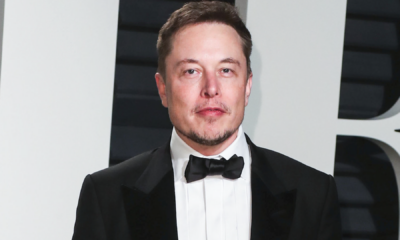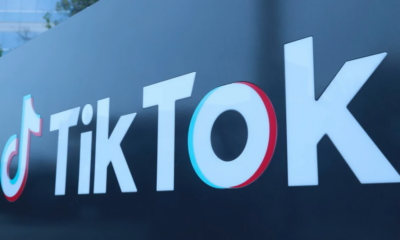NEWS
George R.R. Martin, Other Major Authors Sue ChatGPT Maker OpenAI For Copyright Infringement
Published
8 months agoon

Courtesy of jurassic_horut2003/Instagram
The Authors Guild and group of 17 prominent authors are suing OpenAI, the maker of ChatGPT and GPT-4, for copyright infringement, on the grounds that the artificial intelligence systems were trained on their copyrighted material.
Plaintiffs in the proposed class-action lawsuit include “Game of Thrones” author George R.R. Martin, and other well-known authors including Jonathan Franzen, John Grisham, Jodi Picoult, and more.
“Without Plaintiffs’ and the proposed class’ copyrighted works, Defendants would have a vastly different commercial product,” Rachel Geman, a partner with Lieff Cabraser and co-counsel for plaintiffs and the proposed class, said in a statement. “Defendants’ decision to copy authors’ works, done without offering any choices or providing any compensation, threatens the role and livelihood of writers as a whole.”
The Authors Guild organized the lawsuit to fight back against the unlicensed used of books to create the large language models that can generate texts.
According to the lawsuit, the plaintiffs’ books were downloaded from “pirate ebook repositories” to train the GPT models, “from which OpenAI expects to earn many billions.”
According to the guild, the median full-time author income in 2022 was “just barely over $20,000, including book and other author-related activities.”
“This case is merely the beginning of our battle to defend authors from theft by OpenAI and other generative AI. As the oldest and largest organization of writers, with nearly 14,000 members, the Guild is uniquely positioned to represent authors’ rights,” said Maya Shanbhag Lang, president of the Authors Guild.
“Our membership is diverse and passionate. Our staff, which includes a formidable legal team, has expertise in copyright law. This is all to say: We do not bring this suit lightly. We are here to fight,” Lang said.
GPT users have already been using the system to generate texts that mimic the style of the human authors.
The lawsuit points to a recent attempt to use GPT to generate books six and seven of Martin’s “Game of Thrones” series, “A Song of Ice and Fire,” which have not yet been published. The suit also points to “numerous” AI-generated books posted on Amazon “that attempt to pass themselves off as human-generated and seek to profit off a human author’s hard-earned reputation.”
For fiction writers in particular, the guild says OpenAI’s use of their work constitutes “identity theft on a grand scale,” as the authors have invented “entirely new worlds from their imaginations.”
“People are already distributing content generated by versions of GPT that mimic or use original authors’ characters and stories. Companies are selling prompts that allow you to ‘enter the world’ of an author’s books. These are clear infringements upon the intellectual property rights of the original creators,” said Authors Guild CEO Mary Rasenberger.
“The various GPT models and other current generative AI machines can only generate material that is derivative of what came before it. They copy sentence structure, voice, storytelling, and context from books and other ingested texts. The outputs are mere remixes without the addition of any human voice. Regurgitated culture is no replacement for human art,” Rasenberger said.
“Generative AI is a vast new field for Silicon Valley’s longstanding exploitation of content providers,” said novelist Franzen, winner of the National Book Award and a Pulitzer Prize finalist. “Authors should have the right to decide when their works are used to ‘train’ AI. If they choose to opt in, they should be appropriately compensated.”
The lawsuit focuses on fiction authors “as a first step,” because they are an easily defined class, but the guild also has its eye on harms to nonfiction writers.
“AI opens doors for creative expression,” said AI adviser and tech executive Marva Bailer, author of “Be Unexpected: Resetting Routines to Revolutionize the Future of Work.”
“Millions of copyrighted books, articles, essays, and poetry serve as the foundation for AI systems, yet authors have not received any compensation for their contributions. We need to honor the past to build the future,” Bailer said.
“The unique voices, perspectives, and diversity, contribute to the fabric of our democracy. New models need to be explored to continue the sharing at scale while having shared value,” Bailer said.
“OpenAI is systematically stealing from authors on a mass scale,” said attorney and law lecturer Danny Karon, who is not involved in the case.
Simply put, OpenAI’s algorithm is spitting out books automatically that resemble the works that sprung from these authors’ imaginations, endangering these authors’ ability to make a living because people will conceivably buy AI-generated books instead of the authors’,” Karon said.
“OpenAI has turned these authors’ works into the engines of their own destruction, and OpenAI needs to be held to account under the Copyright Act,” Karon said.
“There is nothing commercially fair or reasonable about what OpenAI is doing to our nation’s greatest authors,” Karon said. “That’s why these authors have combined into a federal class-action lawsuit where all of them stand to benefit from shutting down OpenAI’s sinister enterprise.”
TMX contributed to this article.
More Money + Investing
-


4 Harmful Penny Pinching Habits That Are Sabotaging Retired Boomers
-


Gold prices decline as dollar increases due to strong Fed…
-


Twitter sets date for shareholder vote on Elon Musk
-


Oil prices are rising again, helped by weaker dollar
-


OPEC+ Moves Ahead With Planned Oil Production Cuts
-


Gas prices may soon drop below $4 per gallon, according…
-


Costco Keeps Selling Out Of One-Ounce Gold Bars
-


Fed prepares another rate hike
-


Caesars Entertainment Reports Data Stolen in Cyberattack, Joining Rival MGM
-


TikTok Fined $368 Million By EU Regulators For Failing To…
-


Mortgage Demand Drops As Rates Reach Highest Level In Over…
-


Inflation Ticked Up Again in August, Fueled By High Gas…
